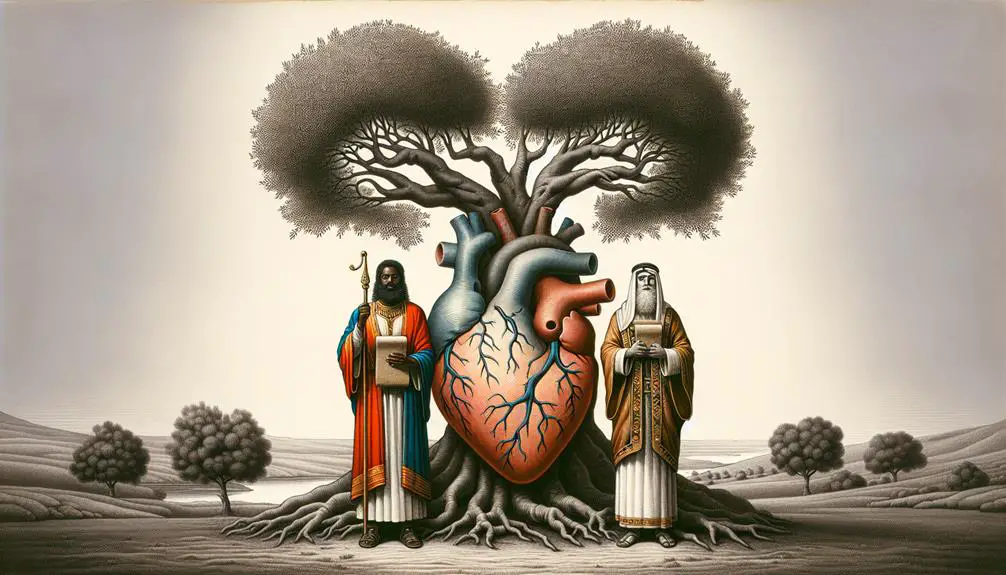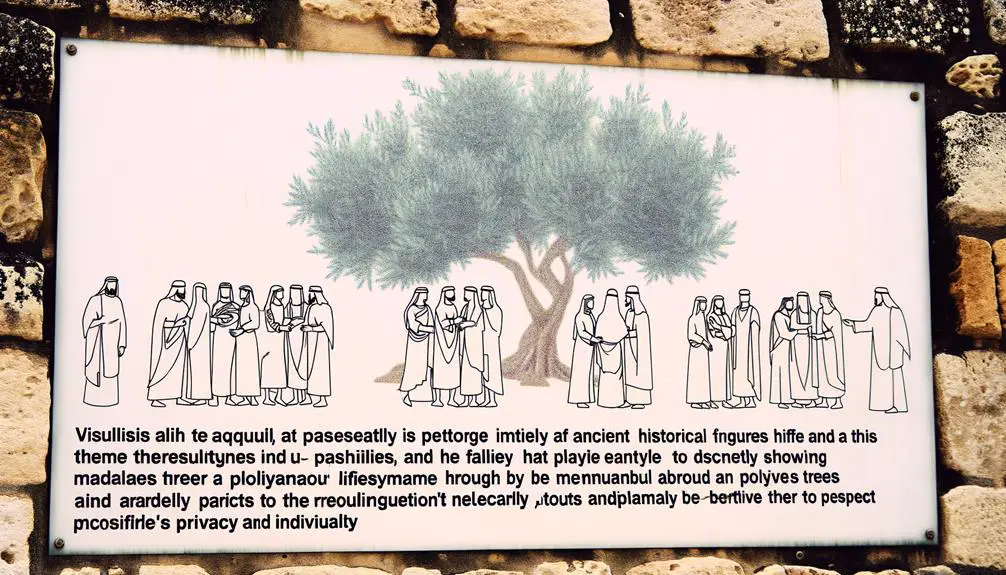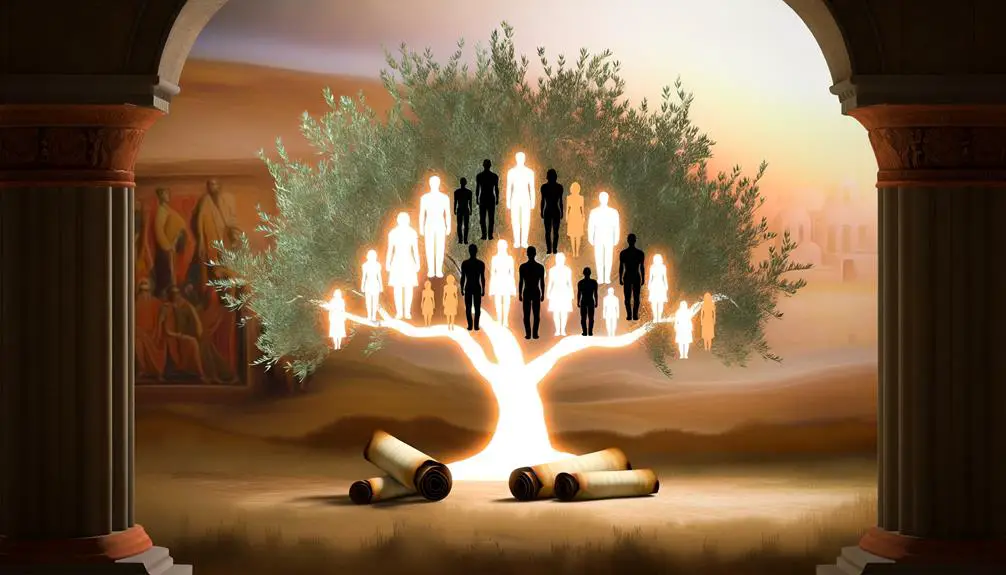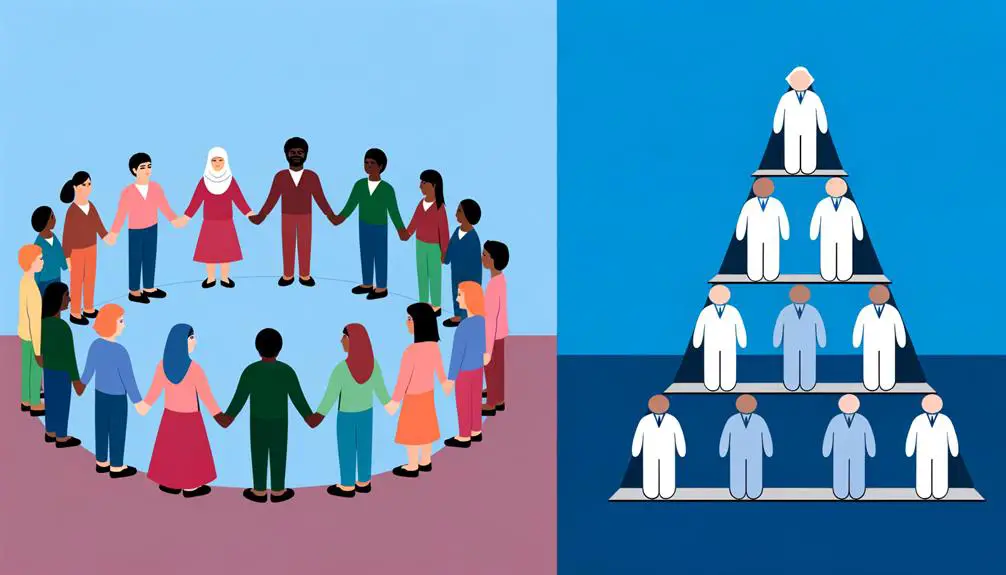From Solomon to modern interpretations, explore the blurred lines of polyamory and polygamy in the Bible's rich tapestry of relationships.

Polyamorous in the Bible
You've probably heard theories about polyamory in the Bible, but how much truth is there to those claims? As you explore the ancient texts, you'll find that the line between polygamy and polyamory is not only fine but also deeply intertwined with cultural and historical contexts.
Figures like Solomon and David introduce discussions on concubinage versus genuine emotional connections. The New Testament's shift towards monogamy adds another layer of complexity. This conversation isn't just about understanding past norms; it's about reflecting on how these ancient narratives influence modern perspectives on love and relationships.
So, let's examine what scripture really says about love in its many forms.
Key Takeaways
- Biblical figures practiced polygamy, influenced by cultural and patriarchal norms, not directly comparable to modern polyamory.
- New Testament teachings emphasize monogamy, with Jesus and Paul advocating for marital exclusivity and faithfulness.
- Ethical considerations in modern relationships, like consent and communication, align with biblical values of love and respect.
- Contemporary dialogues on polyamory challenge traditional interpretations, prompting reevaluation of relationship ethics within religious contexts.
Biblical Figures and Polygamy

Throughout the narratives of the Bible, numerous figures engage in polygamy, a practice that reflects the complex social and theological landscapes of ancient times. This phenomenon isn't merely incidental but is deeply intertwined with the Abrahamic traditions and patriarchal norms that permeated these societies. As you delve into the historical context, you'll discover that polygamy wasn't just a personal choice but a reflection of broader socio-economic and religious frameworks.
The patriarchal norms prevalent in ancient Near Eastern cultures, including those of the biblical figures, often dictated the structure of family and society. These norms afforded men, particularly those of status and wealth, the ability to marry multiple women. This practice wasn't merely for personal satisfaction but was also tied to economic stability, social status, and the continuation of lineage. Within this context, polygamy served multiple functions, including forging alliances, expanding family labor resources, and ensuring progeny.
In the realm of Abrahamic traditions, polygamy is documented without explicit condemnation or endorsement, leading to diverse interpretations across different periods and cultures. The narratives of key biblical patriarchs engaging in polygamy are presented alongside their complex relationships with God, highlighting the intertwined nature of divine covenant and human social practices.
It's crucial to approach these accounts with an understanding of the historical and cultural milieu in which they were written. Recognizing the influence of patriarchal norms and the role of polygamy in Abrahamic traditions allows for a nuanced exploration of these ancient texts, without imposing modern ethical frameworks retrospectively.
Interpreting Ancient Relationships

Interpreting ancient relationships requires a careful examination of the socio-cultural contexts that shaped them, avoiding the imposition of contemporary values on historical practices. In the context of biblical times, understanding the cultural contexts and relationship norms is crucial to grasp the essence of polyamorous relations as depicted or implied within the scripture.
Cultural Contexts |
Relationship Norms |
|---|---|
Patriarchal Societies |
Men often had multiple wives, with marriages arranged for social, economic, or political advantages. |
Economic Considerations |
Wealth and status were directly linked to the number of wives and concubines a man could sustain, reflecting his prosperity. |
Legal Frameworks |
Laws and customs dictated the rights of wives, concubines, and offspring, influencing the dynamics of relationships. |
Religious Influence |
Religious beliefs and interpretations played a significant role in defining acceptable relationship practices. |
In these environments, relationships were multifaceted, with polygamy often serving as a tool for survival, alliance-building, and social structuring rather than purely romantic or personal fulfillment. It's essential to recognize that these practices were ingrained in the fabric of society, influenced by a complex interplay of factors beyond the simplistic notion of love or desire.
Polyamory Vs. Concubinage

Building on the understanding of ancient relationships within biblical contexts, it's crucial to distinguish between polyamory and concubinage, as each holds distinct roles and implications. Polyamory, a term not directly found in biblical texts, refers broadly to consensual, ethical, and responsible non-monogamy. It implies multiple romantic relationships with the knowledge and consent of everyone involved.
In contrast, concubinage in biblical times was a practice where a man had sexual relationships and children with a woman who wasn't his wife, often without the legal status or rights afforded to a spouse.
Ethical considerations play a significant role in differentiating polyamory from concubinage. Polyamory's foundation on consent, communication, and equality starkly contrasts with the historical concubinage, which often involved power imbalances and lacked the concubine's autonomy or choice. The ethical framework surrounding polyamory emphasizes respect and care for all partners' feelings and well-being.
Legal status further distinguishes these relationship types. In ancient times, concubines lacked the legal protections or status granted to wives, which placed them in a vulnerable social position. Modern polyamorous relationships, while not universally recognized legally, operate within a framework that seeks to acknowledge and protect the rights and feelings of everyone involved, despite the absence of formal legal recognition.
Understanding these distinctions sheds light on the complexities of relationships and ethical considerations in biblical times and offers a lens through which to view modern interpretations and practices of non-monogamy.
Monogamy in the New Testament

When examining the New Testament, one finds that monogamy is often presented as the prevailing marital norm, reflecting a shift in societal attitudes compared to earlier biblical texts. This emphasis on monogamy is closely intertwined with the concepts of marital fidelity and specific divorce teachings, which are addressed in various passages.
You'll notice that Jesus' teachings in the Gospels place a strong emphasis on the sanctity and exclusivity of the marital relationship. He advocates for marital fidelity, underscoring it as a cornerstone of a committed, monogamous relationship. For instance, in Matthew's Gospel, Jesus explicitly addresses the issue of divorce, setting stringent conditions under which it may be considered permissible. This stance not only reinforces the ideal of monogamy but also aims to protect the sanctity of marriage by discouraging casual dissolution of marital bonds.
Moreover, the epistles offer further insight into the early Christian community's views on marriage and marital fidelity. Paul, in his letters, advocates for a life of faithfulness within marriage, viewing it as a reflection of a believer's commitment to Christ. His teachings suggest that marital fidelity isn't merely a social convention but a spiritual duty.
Furthermore, the New Testament's divorce teachings serve as a deterrent against the abandonment of one's spouse, thereby reinforcing the commitment inherent in a monogamous marriage. These teachings reflect a broader cultural shift towards valuing emotional and spiritual fidelity within the confines of a singular, enduring marital relationship.
In essence, the New Testament's portrayal of monogamy, underpinned by the principles of marital fidelity and specific divorce teachings, marks a significant evolution in biblical perspectives on marriage, emphasizing the importance of exclusivity and commitment in marital relationships.
Modern Implications and Reflections

Reflecting on the New Testament's emphasis on monogamy, it's essential to consider how these teachings influence contemporary views on marriage and relationships. The New Testament's narratives and parables often serve as moral and ethical frameworks for modern believers and non-believers alike, shaping societal norms and expectations. However, as society evolves, the conversation around polyamory and non-monogamous relationships gains traction, challenging traditional interpretations and prompting a reevaluation of ethical considerations within relational dynamics.
Analyzing the modern implications of these biblical teachings reveals several key areas of interest:
- Ethical Considerations: Ethical considerations lie at the heart of the debate on polyamory versus monogamy. Proponents of non-monogamy argue for the ethical validity of their relationships based on principles of consent, communication, and honesty. These values challenge traditional views but also resonate with the biblical emphasis on love and respect for one's partner(s).
- Community Reactions: Community reactions to polyamory within religious contexts vary widely. Some communities interpret biblical teachings as strictly endorsing monogamy and thus view polyamory as incompatible with their values. Others, however, seek a more inclusive interpretation that acknowledges the complexity of human relationships.
- Adaptation of Religious Practices: As discussions about polyamory become more prevalent, some faith communities are reevaluating how they address relationship structures. This includes considering how polyamorous relationships fit into the broader spectrum of ethical and moral considerations highlighted by religious teachings.
The intersection of modern relationship structures with ancient texts invites a complex dialogue. It requires careful consideration of ethical principles, community values, and the evolving nature of human relationships.
Frequently Asked Questions
How Did Early Christian Communities View Polyamorous Relationships, Outside of the Biblical Texts Themselves?
You're delving into how early Christian communities viewed polyamorous relationships, focusing on community perspectives and seeking historical accuracy.
It's crucial to understand that outside the biblical texts, these communities likely had diverse views influenced by cultural, social, and religious norms of the time. Analyzing historical records, letters, and non-canonical texts can provide insight into their attitudes, which ranged from acceptance in some areas to strict opposition in others, reflecting a complex and nuanced stance.
Are There Any Biblical Laws or Commandments That Directly Address or Regulate Polyamorous Relationships, Beyond the Contexts of Marriage and Concubinage?
You're diving deep, searching for divine mandates on relationship ethics beyond the usual tales of marriage and concubinage.
But here's the twist: the Bible doesn't directly address or regulate polyamorous relationships in the way you might hope. Instead, it's a complex tapestry of cultural norms and teachings from which one must infer principles rather than find explicit rules.
How Might Polyamorous Relationships Impact the Concept of Covenant in the Bible, Especially in Relation to God's Covenants With Humans?
You might find that polyamorous relationships challenge traditional views on covenant symbolism within the Bible. These dynamics could potentially reshape how divine relationships are interpreted, especially considering God's covenants with humans.
Such relationships might suggest a broader, more inclusive understanding of love and commitment, reflecting a diverse manifestation of divine connection. This could lead to a deeper analysis of covenant meanings and their applications in contemporary contexts.
In Biblical Narratives, Are There Instances Where Love and Affection Are Shown in Polyamorous Relationships, or Are These Relationships Primarily Depicted in Terms of Legal and Social Arrangements?
In your exploration of romantic narratives, you'll find that biblical portrayals often emphasize legal and social arrangements over love and affection. This doesn't mean that love is absent in these stories, but societal norms of the time more heavily dictate relationships.
While instances of affection exist, they're not the primary focus. It's crucial to analyze these texts within their historical and cultural contexts to fully understand their perspective on relationships.
How Do Contemporary Theologians Reconcile the Existence of Polyamorous Relationships in the Bible With Current Religious Teachings on Monogamy and Marriage Fidelity?
You're exploring how contemporary theologians handle the topic of polyamory versus monogamy. They delve into modern interpretations and ethical analyses, reconciling ancient texts with today's religious teachings on marriage fidelity.
These scholars dissect scripture, juxtaposing historical contexts with current societal values. Their approach is analytical, weighing the evolution of moral perspectives.
This scholarly endeavor aims to bridge the gap between past narratives and present-day ethical standards in religious communities.
Conclusion
In sum, navigating the waters of polyamory through a biblical lens reveals a complex tapestry of ancient relationships, contrasting sharply with New Testament endorsements of monogamy.
While polygamy and concubinage weren't strangers in biblical times, today's discussions on polyamory invite a re-examination of these narratives, urging a deeper understanding beyond the surface.
As times change, so too does the interpretation of these texts, reflecting modern values while challenging us to look beyond the black and white.



Sign up